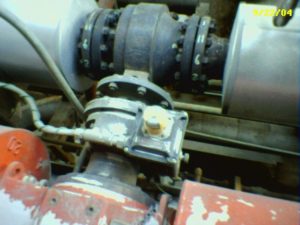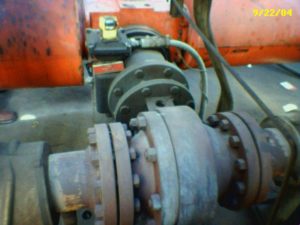Michael Lemeshev - MOGAS
 FCCU Fractionator bottoms recirculation circuit is a challenging service for valve equipment. With temperatures at 650°+F and pressures below 30 psig, this is anything but “run-of-the-mill” service, due to the harsh media that the equipment in this circuit has to endure.
FCCU Fractionator bottoms recirculation circuit is a challenging service for valve equipment. With temperatures at 650°+F and pressures below 30 psig, this is anything but “run-of-the-mill” service, due to the harsh media that the equipment in this circuit has to endure.
At the bottom of the FCCU fractionator, the pumps, heat exchangers, filters and isolation valves must contend with the uncracked heavy hydrocarbons, as well at the by-pass catalyst that the reactor cyclones did not filter out. This mixture wreaks havoc on all these pieces of equipment, as component wear is a killer here. Most FCCU bottoms circuits have redundant equipment: pumps, heat exchangers and filters. Depending on the FCCU feed these components will need cleaning and refurbishment much more frequently than the regularly scheduled FCCU TA cycles… hence the need for redundant equipment.

This is where a severe service isolation valve has merit. Some end-users try to utilize gate valves, but the settling of particulates in the low-flow areas of the valve body, especially at the bottom, creates problems. Most successful operations utilize ball valves due to their improved performance.
Severe service ball valves have several advantages:
- Fast acting quarter turn
- Straight through uninterrupted flow path
- Self-cleaning sealing surfaces
- Overall smaller package than gate valves
- Other considerations specific to MOGAS
 Michael Lemeshev is the MOGAS SME – Refining & Petrochemicals. Michael Lemeshev has been in the refining and petrochemical industries for 25 years and with MOGAS since 2014. While his industry experience includes product and project engineering and the design of flow control and isolation systems, he is most active in technical training and project execution by partnering with end users / refiners, licensors and engineering companies to bring total solutions. A graduate from Texas A&M University with a BS in Mechanical Engineering, Michael has been a contributing subject matter expert for industry publications.
Michael Lemeshev is the MOGAS SME – Refining & Petrochemicals. Michael Lemeshev has been in the refining and petrochemical industries for 25 years and with MOGAS since 2014. While his industry experience includes product and project engineering and the design of flow control and isolation systems, he is most active in technical training and project execution by partnering with end users / refiners, licensors and engineering companies to bring total solutions. A graduate from Texas A&M University with a BS in Mechanical Engineering, Michael has been a contributing subject matter expert for industry publications.






